Fiction competitions are contests where participants, using their own characters, write a story that revolves around a prompt provided by the competition organizer. The organizer then chooses the winners based on how they score on a set of prearranged grading criteria (almost always the Fiction Grading Rubric).
Fiction competitions are the most popular type of fiction writing event, and they are also a good way to encourage members’ character development.
This article provides an overview of fiction competitions from the perspectives of both an organizer and a participant. It includes instructions on how to run a fiction competition successfully, as well as how to submit a fiction entry that qualifies for the competition. If you are interested in the process of fiction writing itself, you can look at Writing Studies, Grammar Studies and the Test of Wisdom.
What are Fiction Competitions?
Fiction competitions are one of the many forms of competition available to the members of the Dark Jedi Brotherhood for participation. They involve writing fictional stories in response to a prompt that is outlined within the Public Competition Details. Competitions must follow the Voice Competition Approval Guidelines. Use of the Fiction Grading Rubric is highly advised, but organizers are permitted to add situational modifiers to the rubric or detail their own grading specifications as long as the criteria are clearly outlined and transparent for participants to see.
In addition to the standard Crescent system of award, Fiction competitions, much like the ACC and Run-Ons, also award Clusters of Ice:
For Fiction type competitions, one (1) cluster is awarded for every 500 words written in a valid entry upon completion of the competition. Because partial Clusters of Ice are tracked and awarded when a whole Cluster of Ice is earned, there are no word count requirements on fictions to award Clusters of Ice.
Creating Fiction Competitions
When you wish to create a fiction competition, it is always a good idea to coordinate with your Unit leaders (House and/or Clan Summit depending on the reach of your competition). Unit leaders are experienced competition organizers who can provide invaluable advice and help you to get your competition approved. Furthermore, by letting them know what you are planning, they can check that it doesn’t clash with other major events and they can help you to advertise the competition in reports and Clan communication channels.
Administrative Process
You can create fiction competitions from the administration panel, which is accessed by clicking your name in the top right corner of the main Brotherhood site.
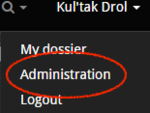
This brings up the administration menu page with multiple options. The competition section is on the left side of the page. Select the “Manage Competitions” option. There will be a green “Create Competition” button that will open the page with all the available competition archetypes you can create.

There are currently two options that will allow you to create a fiction-based competition: Fiction Competition and Regular Competition. The difference is that a Regular competition that is fiction-based will not provide the participants with Clusters of Ice as an award for word count.
For a competition you would like to award Clusters of Ice for, select the “Fiction Competition” archetype.
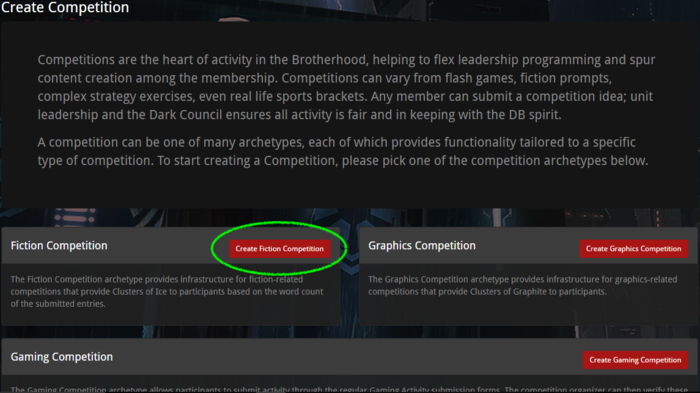
You will then be directed to the creation page where there are fields you must fill out that describe the competition you wish to create. Most of these are straightforward like the title, organizers (the person(s) responsible for creation and grading), and the time the competition starts and ends. When setting the time frame of the competition, it is a good idea to place the start date a few days after the submission for creation as it needs to be reviewed by the proper parties for approval.
At this point you will also decide the “Target Unit” of your competition. This will determine what level of Crescent your top three winners will receive. The table in the Crescents page will help you to decide which tier of Crescents is appropriate based on the target unit of your competition.
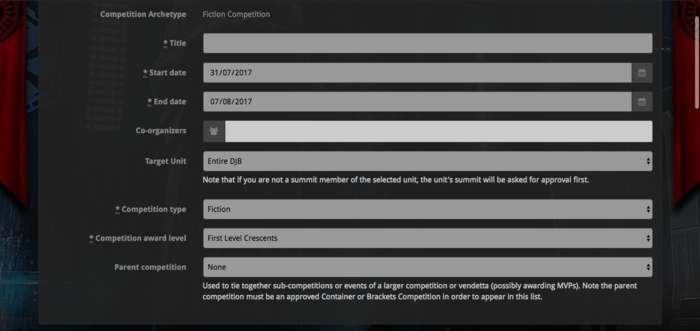
Below the Competition Attributes form you will find the Public Competition Details box. This is where you can write the prompt, rules and grading information for your competition. The content that the Voice Staff expects to see in the Details box is explained in the guidelines below, and it is also set out in the Voice Competition Approval Guidelines.
Guidelines
All fiction competitions approved by the Voice office adhere to the standards and requirements set out in the Voice Competition Approval Guidelines. The main purpose of these guidelines is to guarantee that Clusters of Ice are awarded for the same standard of fiction submissions across the Brotherhood and to make sure that members have a clear idea of how to participate and place in all fiction competitions. By keeping these guidelines in mind while planning your competition you can ensure the speediest possible approval time.
Clear Grading Criteria
The grading criteria most commonly used in fiction competitions are those set out in the Fiction Grading Rubric. The Rubric is the easiest way to show your participants how you are going to score their submissions. While use of the Fiction Rubric is highly advised, it is not compulsory. As long as you clearly define how you are going to grade submissions in the competition details, you can use any grading criteria you deem suitable.
In order to place the Fiction Grading Rubric in one of your competitions you will most likely need to use Markdown. The Markdown code for placing a link would look like this:
(Fiction Grading Rubric)[https://docs.google.com/spreadsheets/d/1_PAFfddgVxriU_o0zD6OQbI9hm1KAArl9BfjXG_2sv8/pubhtml]
Prompt
The prompt is the opening thought from which your competition’s participants develop their story. In this crucial element of the competition creation process, the Voice Staff will be looking for a prompt that is clear and sufficiently detailed for the participant to follow through with a story. In addition, the content of the prompt should follow a few specific considerations:
- Open prompts are prohibited. Open prompts are story cues which give no specific instructions (e.g. “Write a story on any subject you like”). Remember that this is a competition. To be able to judge entries against your grading criteria and against each other, you need a prompt that gives a common starting point or idea to all the stories.
- Star Wars universe prompts. Prompts should relate to the Star Wars universe and/or the Dark Brotherhood universe. While prompts in alternative universes are not prohibited, they must involve the participant’s DJB character and are subject to additional review from the Voice.
- If you are running a DJB-wide competition, your prompt should not have separate options for each Clan. This is to ensure that all your participants’ entries are graded on a level basis.
- Voice Staff does not judge the quality of prompts, but reserve the right to request more specific details, or to make things more clear to the potential participants.
Prompt and Instructions
In your competition details you should always make sure that the prompt is clearly distinguished from the general instructions (e.g. grading criteria, requirements, word limits). Formatting in the details box is done through Markdown, so you can use **bold**, *italics*, ### headers, --- horizontal rules or any kind of visual separator. Below is a competition made by Atty and Turel named “A Mile In Their Shoes” which shows a clear separation between prompt and instructions:
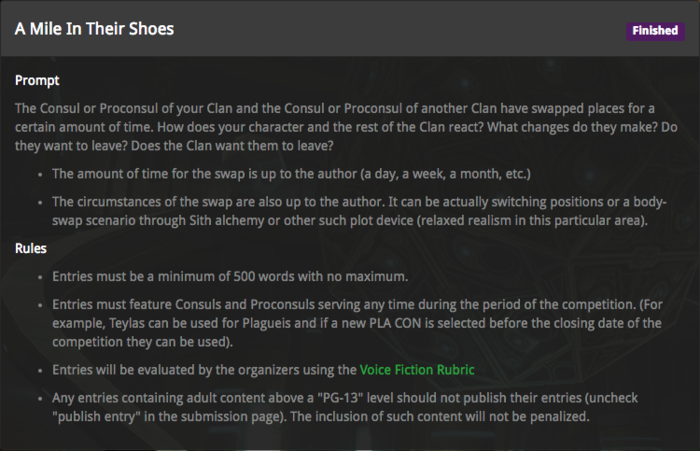
And here is how it was written using Markdown:
### Prompt
The Consul or Proconsul of your Clan and the Consul or Proconsul of another Clan have swapped places for a certain amount of time. How does your character and the rest of the Clan react? What changes do they make? Do they want to leave? Does the Clan want them to leave?
* The amount of time for the swap is up to the author (a day, a week, a month, etc.)
* The circumstances of the swap are also up to the author. It can be actually switching positions or a body-swap scenario through Sith alchemy or other such plot device (relaxed realism in this particular area).
### Rules
* Entries must be a minimum of 500 words with no maximum.
* Entries must feature Consuls and Proconsuls serving any time during the period of the competition. (For example, Teylas can be used for Plagueis and if a new PLA CON is selected before the closing date of the competition they can be used).
* Entries will be evaluated by the organizers using the [Voice Fiction Rubric](https://docs.google.com/spreadsheets/d/1_PAFfddgVxriU_o0zD6OQbI9hm1KAArl9BfjXG_2sv8/pubhtml)
* Any entries containing adult content above a "PG-13" level should not publish their entries (uncheck "publish entry" in the submission
page). The inclusion of such content will not be penalized.
If you’d like a more in-depth primer on the Markdown language you can use in your Competition Details, the Shadow Academy has two courses: Markdown 101 and Markdown 102
Word Cap
Word caps define the minimum and maximum number of words that participants must write in order to be considered for participation in your competition. As the organizer, you need to state the minimum word count in the Details box. The minimum word cap in all fiction competitions must be at least 500 words, as that is the word count required to earn one Cluster of Ice. A maximum word count is not a requirement, but you could include it if you are encouraging a shorter type of fiction.
Submission Checklist
Before you submit your competition, make sure that your Public Details box contains these three basic requirements:
- Grading criteria.
- Separation between prompt and instructions.
- Minimum word cap of 500 words.
Approval/Remand Process
Once you have completed all the details of your competition and double-checked on the guidelines and requirements, you can hit the “Create competition” button at the bottom of the Request Competition page. This will submit your competition to the proper authorities for approval, which, in the case of fiction competitions, are your unit leaders, the Voice Office and the Master at Arms Office in that order.
Standard Approval Process:
Clan/House Leadership -> Voice Staff -> Master At Arms Staff
When the Voice Office receives your competition, they will look through it to make sure it adheres to the guidelines set out in the Voice Competition Approval Guidelines. If they spot any issues in this regard, they will “remand” your competition request, and you will receive an email detailing why the competition was remanded and what you can do now to get it approved. At this point your competition is located here:
Administration Panel > Items requiring your attention > Remanded competitions > Competition sheet
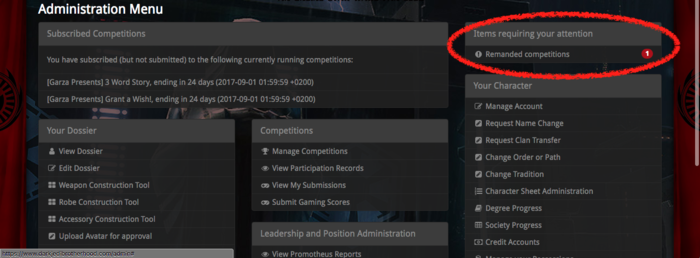
This is your Pending Competitions panel. It shows the details of your competition and the notes pertaining the remand:
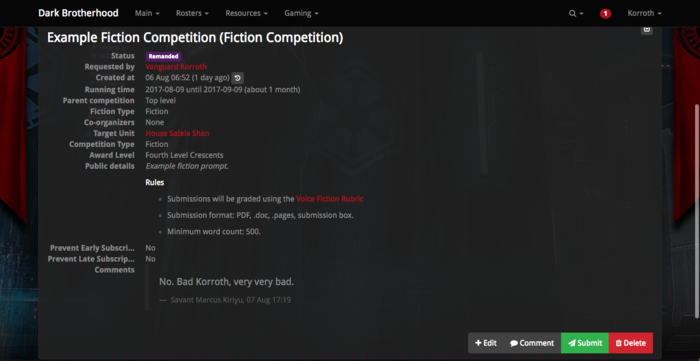
From here you can edit all aspects of your competition and re-submit for approval by the Voice Staff using the appropriate buttons on the bottom right. If you have any questions regarding the remand and the steps you can take to have your competition approved, you can email the Voice Staff at djb-voice-staff@googlegroups.com with your question and the name of the competition.
Once the Voice Staff approves your competition it will go through to the MAA Staff, who will process it according to the standards by which all Club competitions are approved or remanded (see the Leadership Competitions course for further details on that). Upon approval by the MAA Staff, your competition will appear under the “Upcoming” or “Running” tabs of the Club’s competitions lists (this is a good time to start advertising your competition on the Fiction and/or unit Telegram channels) and members will be able to view and participate in the competition.
Submission
This section, aimed at the competition participant, will show you how to interpret and submit to fiction competitions. As with all competitions, these are found in the main Competitions listing. The specifications you should take special note of in fiction competitions are the prompt, grading criteria and instructions like word caps and submission formats.
Word Processing Programs
While Microsoft Office’s ”Word” is the most well known word processing program in circulation, it costs money to use and can be quite expensive. Mac users also have the option of purchasing ”Pages”, which also costs money. If you are not in a position to afford or have access to these programs do not fret. There are plenty of free alternatives to help you create and write your fictions!
Google Docs is the most common platform in the Dark Jedi Brotherhood. It is a free service that offers cloud storage and near-instant backup, as well as collaborative editing and sharing features. It also comes free to anyone with a gmail address. If you don’t have a gmail address, Google Docs will still work or link to your other accounts. You can also create a free account at any time.
Other alternatives include:
- Open Office - a free, open source version of Microsoft Office.
- LibreOffice - a free, open source Microsoft Office alternative.
- NotePad - comes pre-installed on all Windows machines
- TextEdit - comes pre-installed on all Mac OS computers.
It’s always a good idea to have your fictions proofread by another set of eyes, whether they are a fellow clannmate, friend or even a family member. Proofreading is a great way to increase your chances of placing in an competition.
The Prompt
The prompt is the initial story idea that the competition organizer provides to stimulate your story-writing creativity. It is a good idea to keep the prompt in mind as you plan and write your entry, because adherence to prompt will affect your Creativity and Realism scores in the standard Voice Fiction Rubric, as you will see in the section below.
Word caps
Competition organizers will specify a minimum required word count (usually 500), and they may sometimes impose a maximum limit as well. To be considered for participation and be awarded Clusters of Ice, your entry has to meet the word caps. It’s easy to get a word count for your story; all mainstream word processors have a word count function. First, select the text of your story (taking into account that competition organizers may not count long ID lines, explanatory notes or copy-pasted prompts), then:
Microsoft Words: Tools > Word Count…
macOS Pages: View > Show Word Count (appears at the bottom)
Google Docs: Tools > Word count
Submission Formats
There are several ways to submit your entry to the website. The preferred submission format is PDF, since it is an easy way to produce well-presented text which everybody can read. There are many other ways to submit your entry however: you can simply copy-paste your text into the submission box, or submit a sharing link to your Google Doc, or you can upload a .doc, .docx, .pages or .rtf file. Read the competition instructions carefully, as many organizers will specify which formats they will accept. If they state they do not want Google Docs links, you can instead obtain a PDF of your entry thus:
Google Docs: File > Download as > PDF document (.pdf)
Grading Fiction Competitions
This section, aimed at the competition organizer, details the process after the competition ends, from the awarding of Clusters of Ice to the grading and use of the Rubric.
Word Count
The word count determines the amount of Clusters of Ice that each participant earns for their entry. If an entry is disqualified because it did not adhere to the word count limits, the participant will not receive CIs. The word count is performed automatically by the website once the competition ends, but you should always check and correct the count if long ID lines or copy-pasted prompt text make a significant difference to the figure. Only the title, body text and location headers, if present, should be included in the word count.
Using the Fiction Grading Rubric
The primary way of grading fiction competitions is through the Official Voice Fiction Rubric. The rubric splits into four main categories with percentages based on what it should count towards in the final grading:
- Spelling/Grammar/Mechanics (15%): syntax errors that make the text difficult to read will lower this score. Tense (past, present), person (I, he/she), punctuation, spelling and sentence structure all fall under the category of syntax.
- Creativity (20%): this score looks for engaging plots, interesting characters and effective use of the environment and the competition prompt. Use of clichés and predictable plotlines will lower this score.
- Realism (25%): effective use of Character Sheets, DB and SW canon, and adherence to the competition prompt.
- Story (40%): this score deals with plot mechanics, such as how the character’s thoughts, feelings and emotions are presented, from what perspective the story is narrated, how the story arc, conflict and characters are developed, and the general entertainment value of the story.
The Rubric is also numbered one to four in order to help you decide whether or not your grading can fit into one of those categories. The Voice office encourages the usage of the Fiction Grading Rubric because it clearly outlines what is required to get a top position in a competition (one of the main requirements to submitting a competition). The Fiction Grading Rubric is the grading scheme that is used in all official Dark Council-organized Vendettas and Great Jedi Wars, so using it is good practice for these big competitive events. However, the Fiction Grading Rubric can be foregone for another clearly stated set of requirements.
Feedback and Grading
If you are using the Fiction Grading Rubric, your task will be to relate the entry you are grading to the Rubric’s tiered score system. The easiest way to provide feedback is to leave comments on each entry. Members can then see this feedback by going to their Administration Panel -> View My Submissions.
Alternatively, the Voice Staff has made a template grading sheet available to members. To start using it, simply go to File > Make a copy… > OK > Example Grading Sheet (tab at the bottom). It is a good idea to make notes of how you reached each score, what you enjoyed about the story, what you think the participant could improve and how they could improve it. This is the type of information and guidance you would show a participant should they ask for detailed feedback. When giving feedback remember that the aim is always to help and encourage the participant to improve their work.
Summary
A well-organized fiction competition communicates its intent and instructions clearly to all participants, so that everybody knows how entries will be considered for participation and how winners will be chosen. To ensure your competition runs smoothly, check it adheres to these elements:
- Fiction competitions archetype
- Clear grading criteria
- Minimum word cap of 500
- Separate prompt
- Submission feedback
Armed with the knowledge contained in this course, the Voice Competition Approval Guidelines and the Fiction Grading Rubric, you should feel confident in taking on the Fiction Studies exam!